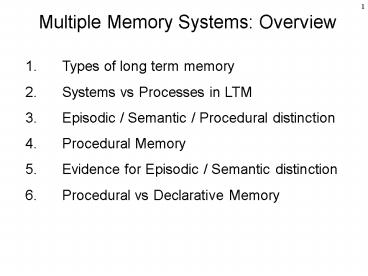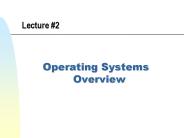Multiple Memory Systems: Overview - PowerPoint PPT Presentation
1 / 26
Title:
Multiple Memory Systems: Overview
Description:
These questions reveal the different 'types' of long term ... Jigsaw puzzles. mirror-reading. mirror drawing / writing. Tower of Hanoi. Closure pictures ... – PowerPoint PPT presentation
Number of Views:132
Avg rating:3.0/5.0
Title: Multiple Memory Systems: Overview
1
Multiple Memory Systems Overview
1. Types of long term memory 2. Systems vs
Processes in LTM 3. Episodic / Semantic /
Procedural distinction 4. Procedural
Memory 5. Evidence for Episodic / Semantic
distinction 6. Procedural vs Declarative Memory
2
Background
1. When did you last ride a bicycle? 2. What is a
bicycle? 3. How do you ride a bicycle?
These questions reveal the different types of
long term memories we are capable of accessing.
1. Requires conscious recollection of unique
temporally distinct past experience
2. Requires conscious recollection of knowledge,
but no unique experience
3. Unanswerable - unconscious learning
Researchers have developed a number of different
ways to conceptualise these differences
3
Background
Important question is Are there different LTM
systems OR different types of information stored
within a unitary LTM?
Question reflects an important debate concerning
the cognitive architecture of memory Systems
vs Processes Is memory best characterised as
comprising multiple independent systems
(structures with individual properties) OR as a
unitary system, on which a variety of different
processes operate on information stored in a
variety of different codes
4
Tulvings Model
The relationship between types of LT memory and
varieties of consciousness (Tulving, 1985).
Degree of conscious awareness
Memory System
5
Tulvings Model
The episodic / semantic / procedural distinction
Distinction makes intuitive sense Subjects do
not forget words - they forget information
regarding the fact that the word was presented to
them during the expt. Episodic, semantic and
procedural memories are interactive Learning the
meaning of a new word originally requires an
episodic memory. Over time the meaning becomes
assimilated into semantic memory and the original
learning episode may be forgotten Learning to
type initially requires episodic memory for the
layout of the keys. Over time this becomes
redundant The ability to disconnect information
from the context in which it was learned is a
useful property for a memory system - it saves on
storage.
6
Tulvings Model
Memory Systems and Memory Tasks
Tulving argues it is important to make the
distinction between memory systems and memory
tests Until recently considered equivalent
e.g. Episodic memory test (recognition of words)
requires Episodic memory system In fact, things
are much more complicated - people can do certain
episodic memory tests by using non-episodic
memory systems e.g. you can know that you
have seen a word on a recognition test before -
without consciously recollecting the event of
studying it. It is this conscious recollection
that defines the episodic system
7
Evidence for E/S/P distinction
Procedural Memory - Neuropsychological data
Claparade, 1911 Procedural learning in Korsakoff
patient.
Patients with amnesia are able to learn a number
of tasks, despite having no episodic memory for
learning them.
Other research using larger groups of patients
with amnesic syndrome demonstrate that they can
learn this task as well as controls.
8
Procedural Memory
Amnesics also demonstrate normal or near normal
learning on a wide variety of other tasks.
Dress making Finger mazes Jigsaw
puzzles mirror-reading mirror drawing /
writing Tower of Hanoi Closure pictures Repetition
priming
However, it is not clear what (if anything) these
tasks have in common.
9
Procedural Memory
So what is procedural memory?
Danger of circularity - learning which is
preserved in amnesia is termed procedural...
Moscovitch (1984) Amnesics will do well if
1. It is obvious what is required 2. Responses
exist in patients repertoire 3. Does not require
specific past events to be recalled
However, amnesics are very slow to learn many
things (e.g. programming a personal organiser)
Perhaps there are a number of different types of
learning, some of which do not rely on episodic
memory (Baddeley, 1990)
10
Episodic / Semantic Distinction
Evidence for episodic - semantic distinction
Obvious interdependence of two memory systems
makes finding evidence for distinction difficult
Chacacteristics of episodic and semantic memory
Episodic Memory Reference is to
oneself Organised temporally Events remembered
consciously Susceptible to forgetting Context
dependent
Semantic Memory Reference is with respect
to general knowledge Not organised
temporally Events are known Relatively
permanent Context independent
But what about important autobiographical
events? The first time I - semantic or
episodic?
11
Forgetting
Episodic - Semantic Distinction Forgetting
Episodic memory is more prone to forgetting
Some semantic memory has been described as
Permastore
40 of Spanish vocab learned at school is
retained 50 years later (Bahrick, 1984)
However, certain episodic events also appear very
resistant to forgetting -
Autobiographical first-time events Dramatic,
emotionally arousing events which lead to
flash-bulb memories
No real evidence that there is anything special
about these types of memory
12
Neuropsychological Data
Episodic - Semantic Distinction
Neuropsychological data
Amnesic patients have intact conversational
skills and perform normally on intelligence tests
(which assess knowledge). But - cannot remember
doing either five minutes later. So episodic,
not semantic memory is impaired in amnesia? Not
necessarily - IQ tests and language acquired
before onset of amnesia - not comparing like with
like. So amnesia impairment to acquire new
information (both episodic and semantic?)
Gabrieli et al, 1983 Trained HM with meanings of
new popular words. Showed very little
learning However, not surprising if semantic
memories are built up from episodic memories
13
Reterograde Amnesia
Episodic - Semantic Distinction Reterograde
Amnesia
Comparing like with like Most amnesics also
demonstrate reterograde amnesia - difficulty in
recalling information (semantic and episodic)
acquired prior to the onset of amnesia. Determini
ng the extent of reterograde amnesia
difficult Has patient forgotten or simply did
not know in first place? Butters Brandt,
(1985) - PZ Alcoholic science professor -
developed WKS at 65 Autobiography (episodic) and
publishing career (semantic) provide reasonable
indication of what he knew when PZ demonstrates
poor recall of both the names of scientists in
his discipline, and his major life events.
.
14
Reterograde Amnesia
Amnesics also have deficits on famous faces test
Controls
Amnesic patients
Although intuitively plausible, episodic /
semantic distinction not well supported by
evidence.
Episodic and semantic memories clearly differ in
content but may be different expression of same
underlying LTM system.
15
Update
Episodic - Semantic Distinction Update
Wheeler, Stuss Tulving (1997) - reformulated
the episodic / semantic distinction. Placed a
greater emphasis on distinction in terms of
conscious experience. Also argued that episodic
memory (and the conscious act of remembering) is
particularly dependent on cortical networks
involving PFC. Two lines of supporting
evidence 1. neuropsychological evidence from
patients with frontal lobe lesions. 2.
Functional imaging data from PET / fMRI studies.
.
16
PFC Lesions
Episodic - Semantic Distinction PFC lesions
PFC lesions usually result from Head injury,
Neurosurgery Aneurysm
.
17
PFC Lesions
Episodic - Semantic Distinction PFC lesions
PFC lesions do not result in a full blown amnesic
syndrome In fact, until recently, memory was
thought to be essentially intact in these
patients However, careful testing reveals
interesting pattern of impairment. In a
meta-analysis of studies assessing free recall,
cued recall and recognition in patient with
frontal lobe lesions, 2 findings emerged 1.
Recall is more impaired than recognition
(particularly when strategies can be used at
encoding and/or retrieval 2. Numerically, even
recognition memory is poor, relative to controls
.
18
PFC Lesions
Episodic - Semantic Distinction PFC lesions
Wheeler, Stuss Tulving (1995) argued that this
pattern of results occurred because successful
recall is more reliant on conscious recollection
than successful recognition. BUT Both can be
influenced by non-conscious memory. Frontal lobe
patients also have other interesting memory
impairments- Source Amnesia Patients can often
remember the item / fact that was learned, but
cannot remember where or how the information was
acquired.
.
19
Source Amnesia
Janowsky et al (1989) Asked FL patients and
controls to remember a list of previously
unrecallable facts (e.g. The name of the dog on
the crackerjacks box is Bingo) 7 days later
recall tested. Subjects asked about 20 old facts
and 20 new facts. When Ss answered correctly,
they were asked to recollect the source of the
info How did you learn this fact? When was the
last time you heard this fact? Source Error
1. Correctly recalling learned fact, but falsely
reporting that it was last encountered before the
learning trial 2. Correctly recall a new fact,
but falsely reporting that it was learned during
the learning trial.
.
20
Source Amnesia
Result could be taken as evidence for
dissociation between semantic (fact) and episodic
(source) memory.
.
However, current theories ascribe this result to
a specific impairment in the ability to encode /
retrieve contextual information
21
Functional Neuroimaging
PET / fMRI Take advantage of fact that cognitive
processes are accompanied by neural activity in
the brain. This activity requires fuel and is
therefore accompanied by regional changes in
blood flow. In PET, these changes are detected
by labelling blood with radioactive isotopes
(glucose or water) In fMRI, they are detected by
measuring the difference in the magnetic property
of oxygenated vs deoxygenated blood Interpretatio
n of the resulting images from both techniques
rely on subtraction methodology.
.
22
Neuroimaging Data
Tulving (1989)
Subject thinking about personal happenings 40
years ago (Episodic retrieval)
.
23
Neuroimaging Data
Tulving (1989)
Subject thinking about The history of
astronomy (Semantic retrieval)
24
Neuroimaging Data
Tulving (1989)
Subtraction Image Red episodic Green
semantic Episodic retrieval requires more
anterior (mainly R) regions of the cortex
Essential pattern replicated in other studies -
but what does activation actually represent?
25
Summary
- Episodic / Semantic distinction is intuitively
plausible - There is something phenomonologically different
about remembering what you had for breakfast and
the name of the worlds highest mountain - However, there is little compelling evidence
that the distinction reflects the operation of
two completely distinct memory systems. - The debate is still active, and the terms are
widely used, just not nec in the way in which
Tulving proposes - Baddeley speculates that semantic memories
result from an accumulation of similar episodic
memories. They become knowledge when we are no
longer able to retrieve individual learning
episodes
.
26
Alternative Distinctions
Declarative vs Non Declarative (procedural)
Cohen and Squire (1980) - episodic and semantic
replaced withdeclarative Refers to any memory
which is consciously inspectable
Echoes distinction made by Ryle
(1949) Knowing that vs Knowing how
Thus amnesics have impaired declarative memory
and intact procedural memory Good description,
but not much of a theory Distinction not clear
cut - some skills require both procedural and
declarative memory































